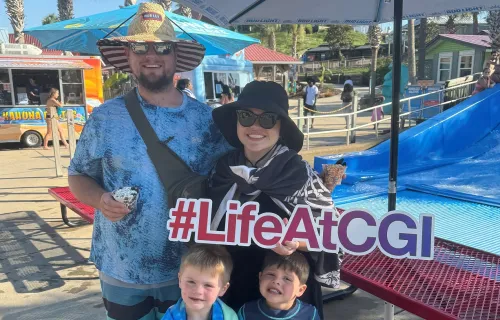I left a prestigious global law firm to join CGI, and I haven't regretted it for a moment. Even as a partner in the firm, I never felt fulfilled there. I always felt a looming sense of dissatisfaction over the fact that, as an external counsel to a company, you dispense advice in the abstract and often never really know what happens as a result.
Now I am the General Counsel for CGI's U.S. Commercial and State Government Strategic Business Unit in Fairfax, Va., leading a team of about 20 CGI members, a mix of lawyers, contract negotiators and an intellectual property expert. I made the shift in 2005 because I wanted an opportunity where I'd be closer to the business on a day-to-day basis.
In those 17 years, I've been proud of my team. We work closely with business unit leaders, their deputies and executive teams on a wide range of legal matters. I think many legal teams in other companies get a reputation of being the "department of no."
We prefer to be creative, always looking for a way to say yes when the law or the company’s risk parameters allow. In rare instances it may be close to a “no”, but my team and I will always exhaust every option and try to find a viable way to make a deal work. I think we're unusually nimble and creative while still appropriately concerned with risk management, so it's a careful balance.
Living authentically at CGI
Another facet of my law firm life that I did not enjoy is that I never felt the freedom to really be myself as a gay man. Conventional wisdom would have you believe that really big law firms are necessarily a welcoming place for a diverse population, and I think that's probably true in most cases today. In the early 2000s, however, I didn't really feel that freedom. Maybe it was self-imposed, but when you're gunning to make partner, you don't want to do anything that could compromise your viability there. I didn't feel like I could really be myself.
When I joined CGI, I was able to walk in the door and not feel a need to be someone else or hide a part of myself. I think that started almost immediately in my dealings with CGI, during the interview process before I was hired. There were a couple of occasions where someone asked an appropriate personal question, and I didn't feel any reluctance to speak openly about some personal circumstance, or the fact that I had a partner.
I have reflected on that some through Pride Month. Feeling the flexibility, the freedom, the confidence to show up as who you are is an element of pride for me. I'm a little older than some of you, so it wasn't a foregone conclusion for me while growing up that I would ever have that freedom and confidence.
In my generation, and to some extent I suspect even now, one of your priorities as a young gay kid is just to avoid getting the crap beaten out of you. Then you graduate—in my case, law school—and your mission becomes concealing who you are long enough to rise through the firm and become a partner, and beyond that, just hope that who you are doesn't inhibit professional success.
I'd like to think that considerations like that are irrelevant today, although I know that's not always the case. I think what Pride means to me is that we’ve come a long way. We aren't there yet, to the point where one's orientation or gender identity is never an issue, but a lot of progress has been made and that makes me very happy.
It's nice to be able to talk about my family without having to conceal it. If you haven't experienced the stigma that same-sex relationships carry for some, you might not appreciate how big a deal that is. From the moment I started working at CGI I felt much more comfortable. I wasn't shouting it from the rooftops when I started, but I felt completely free to be myself.
When I became General Counsel, the Obergefell vs. Hodges case—which eventually legalized same-sex marriage nationwide—was before the Supreme Court. There was a small consortium of household-name tech companies that asked me to sign on as general counsel to an amicus brief in connection with the case. An amicus brief is basically just an opportunity for non-parties to litigation to have their say either in support or against the positions being taken by the parties.
This consortium rightfully thought that it was important to support same-sex marriage, and I was obviously fully supportive of that effort, but I did hesitate briefly. I thought, well, okay, I'm going to have to go in and talk to George Schindler, who was CGI's U.S. President at the time (he is now CEO). He was immediately supportive, as though it was a no-brainer question. I say that just as an example of my feeling free to be who I am and feeling supported at the highest levels. My immediate boss, Chief Legal Officer Benoit Dube, has always been fully supportive as well and has met my partner, Vic, on numerous occasions.
Advice for allies
Colleagues are sometimes a little leery of seeming nosy or intrusive. I suppose they worry they might make me, as their colleague, feel uncomfortable if they were to ask a question that would provoke an answer that reveals the fact that I'm gay. I understand why they do that, but a quick and easy way to serve as an ally is to ask your LGBTQ+ colleagues about their lives outside the office. It's so simple, and it's something everyone does anyway, so sometimes when you're the gay guy, you can feel left out. It's not intentional exclusion of course, but in practice, that's how it sometimes works out.
Read more CGI member stories in the Life at CGI blog series.
Want to join us? Find your next opportunity at CGI Careers or join our talent network.







